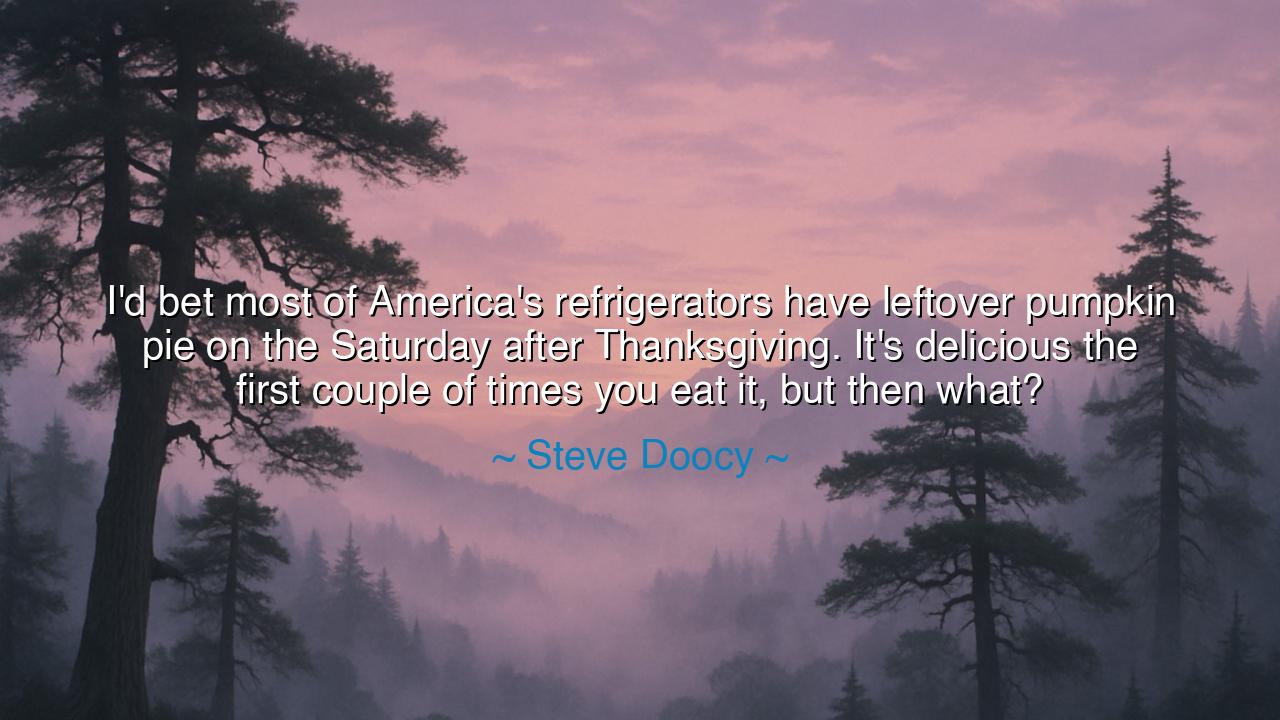
I'd bet most of America's refrigerators have leftover pumpkin
I'd bet most of America's refrigerators have leftover pumpkin pie on the Saturday after Thanksgiving. It's delicious the first couple of times you eat it, but then what?






In the lighthearted yet piercing words of Steve Doocy, we are given a vision that is at once comical and profound: “I’d bet most of America’s refrigerators have leftover pumpkin pie on the Saturday after Thanksgiving. It’s delicious the first couple of times you eat it, but then what?” At first, these words seem no more than an observation of holiday excess, a passing remark on the abundance of food that lingers after the feast. But beneath the humor lies a truth ancient and enduring: what is plentiful may lose its savor, and that which is repeated without renewal grows weary to the soul.
The symbol of pumpkin pie, sweet and cherished, is not merely about food. It is about life’s delights. At first, the taste thrills, and the heart rejoices. But when consumed again and again without pause, the sweetness dulls, and the gift becomes a burden. In this, Doocy reminds us of the balance that mortals must keep between abundance and moderation, between celebration and restraint. For even joy, if hoarded and overindulged, can transform into indifference. The pie becomes a parable for all of life’s pleasures.
History offers us a mirror to this truth. In the courts of ancient Rome, emperors feasted endlessly, filling their banquets with meats, fruits, and confections. Yet many grew restless, their appetites dulled by abundance. Juvenal, the satirist, mocked the people who cried only for “bread and circuses,” their souls numbed by endless indulgence. So too with our modern Thanksgiving table: when gratitude gives way to gluttony, and when joy is replaced by repetition, the spirit weakens, leaving us to ask, like Doocy: “but then what?”
Yet the words also carry a gentler meaning. The presence of leftovers is itself a sign of blessing. To have too much pie is still to have pie at all, and there are many across the earth who would give much to taste even one slice. Thus, the challenge is not to despise the excess, but to transform it—by sharing, by creating anew, by remembering the spirit of gratitude from which the feast first arose. What is left over should not be forgotten; it should be given purpose.
There is a story from the Great Depression that shines with this wisdom. Families with little would take the remnants of meals—stale bread, bones, and scraps—and turn them into soups and stews that nourished many. Nothing was wasted, for in those lean days, each morsel was a treasure. And here lies the teaching for us: where one man sees tired pumpkin pie, another may see nourishment, sweetness, and hope. What we cast aside can still bless another.
Thus the lesson is clear: all abundance must be tempered with gratitude and creativity. When life offers you more than you can enjoy, do not allow it to wither in neglect. Instead, transform it into something new—share it with a neighbor, gift it to a stranger, or reimagine it with your own hands. The pie that grows dull to you may yet be delight to another.
Practical actions spring forth like seeds from fertile soil: before you waste, consider how to use. Invite others to share what is left. Give thanks not only for the first taste but for every portion that remains. And above all, do not let repetition rob you of appreciation. Seek renewal in all things—whether in food, in work, or in love—lest the sweetness of life be lost in monotony.
So, O reader, hear the wisdom hidden in Doocy’s jest. The pumpkin pie of life is fleeting in its sweetness, yet abundant in its lessons. Savor it, share it, and transform it, lest you find yourself staring at blessings grown stale. For the true feast lies not in the dish itself, but in the spirit of gratitude and generosity with which it is received.






AAdministratorAdministrator
Welcome, honored guests. Please leave a comment, we will respond soon